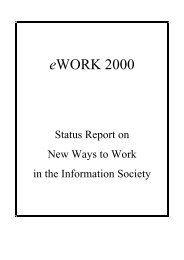1996 - European Telework Week
1996 - European Telework Week
1996 - European Telework Week
- No tags were found...
You also want an ePaper? Increase the reach of your titles
YUMPU automatically turns print PDFs into web optimized ePapers that Google loves.
<strong>Telework</strong> 96<br />
2.6.2. Telecentres and smaller businesses<br />
Much of the potential for job creation in Europe rests with small and medium-sized<br />
enterprises (SMEs). The HRM TC, TWIN and EVONET projects all made contributions<br />
to exploring ways in which small businesses and the self-employed can make use of<br />
Telecentres and teleworking.<br />
If SMEs are important, there is clearly a strategic value in ensuring that business advice<br />
is made available to this sector in a suitably appropriate form. Whether provided by<br />
private-sector organisations or public bodies, business advice generally tends to be<br />
delivered at a local level. Telematics, however, enables advice centres to network<br />
together to share resources and expertise.<br />
This was the starting point for the HRM TC project, based in the former steel-production<br />
centres straddling the French (Lorraine), Belgian (Wallonie) and Luxembourg borders,<br />
which developed a model of TeleService Centres (Centres de TéléService). This model<br />
was demonstrated in a pilot trans-border scheme involving three CTSs, in Belgium and<br />
France.<br />
Under this model, the business person seeking assistance makes contact with a local<br />
TeleService Centre either in person, by telephone, by fax, or via an on-line service. Each<br />
individual centre is networked together through computer links, and enquiries which<br />
cannot be dealt with locally are passed through the network either to another TeleService<br />
Centre or to an individual expert specialist, also connected to the network.<br />
Small businesses can also use telematics to develop markets outside the immediate<br />
locality, or indeed the country, where they are based. The idea of companies effectively<br />
creating a 'virtual' presence for themselves in other countries was something which the<br />
EVONET project explored in a very practical way.<br />
EVONET developed technology for an international telephone switching service, which<br />
will enable Telecentres or business centres in one country to act as virtual offices for<br />
companies based in other countries. Under this service, calls from potential customers in<br />
one country are answered and then forwarded automatically to the appropriate person in<br />
the host company, without the caller necessarily being aware of where the person they<br />
are talking to is based.<br />
EVONET’s 'trunk-to-trunk switching' service has been successfully implemented at four<br />
business centres. Unfortunately, however, there are legislative restrictions in force in<br />
several countries which have yet to liberalise their international telephony rules, which<br />
currently mean that this service cannot be used in all <strong>European</strong> countries.<br />
Disabled people face barriers of other kinds, and because of economic, social and<br />
political hurdles in their way are more likely than other groups to make their own work<br />
through self-employment. <strong>Telework</strong>ing can expand dramatically the employment<br />
possibilities for disabled people and the development of assisting technology means that<br />
the disabled now, for perhaps the first time, can compete in the labour market on a more<br />
or less equal footing.<br />
The TWIN project partners between them monitored developments at eleven pilot sites<br />
where people with disabilities were undertaking training in teleworking or were engaging<br />
in telework itself. These were in Greece, Italy, Finland, Ireland and the UK.<br />
- 49 -








